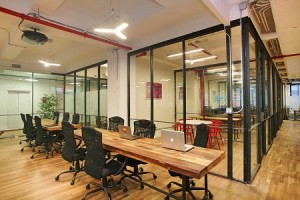
The office market in Vietnam’s major cities has witnessed strong growth of the co-working office model. At present, this model is not only booming in two major cities, Hanoi and Ho Chi Minh City, but also spreading to Da Nang, Hai Phong and Ba Ria-Vung Tau.
By Binh Nguyen
The co-working office segment targets two kinds of occupiers: small-sized companies and freelancers. In these spaces, individuals sit interleavely and work independently while still sharing their work and ideas together. By choosing co-working offices, businesses and self-employed workers can save on cost, as the office rent includes all service charges such as power, water, security, Internet and office equipment.
The co-working office model was born to replace traditional office spaces that are not flexible enough to fit the needs of small-sized businesses. Previously, small businesses in Vietnam set up their offices in apartments. But this practice is no longer allowed, and the restriction has created a huge demand for co-working space.
For small-sized businesses, co-working is a cost-saving solution compared to leasing traditional offices, because traditional office spaces are usually larger than their space demands. In addition, co-working also attracts freelancers because this model allows them to work independently in a private space or meet, discuss and share ideas with peers.
The booming co-working office model in Vietnam is due to fluctuations of the economy and changes in working behaviours, said Hoang Dieu Trang, senior manager of commercial leasing at Savills Hanoi.
Recession always encourages the start-up trend, leading to a boom in small and medium-sized enterprises (SMEs) and creating a culture of entrepreneurship. According to the General Statistics Office, SMEs account for 97 percent of enterprises established in Vietnam over the past 15 years and employ about 50 percent of the workforce. In the first seven months of 2017, the number of established businesses hit 72,953, up 13.8 percent over the same period last year. In addition, creativity and flexibility are two criteria highly appreciated in society nowadays. The co-working office model is consistent with these criteria.
The co-working office model continues to attract investment in Vietnam’s major cities. This model is gradually being integrated into other types of real estate such as retail spaces and hotels. At trade centres and hotels, many developers have built spaces for co-working offices, rather than just focus on retail space or accommodation. Demand for co-working office space keeps increasing while supply is limited. Therefore, according to Trang, in the future, this model will grow as a potential market in Vietnam.
This article originally appeared on property portal Batdongsan.
Related Articles:
Chip Eng Seng unit sells Australia office building for AU$68.84m